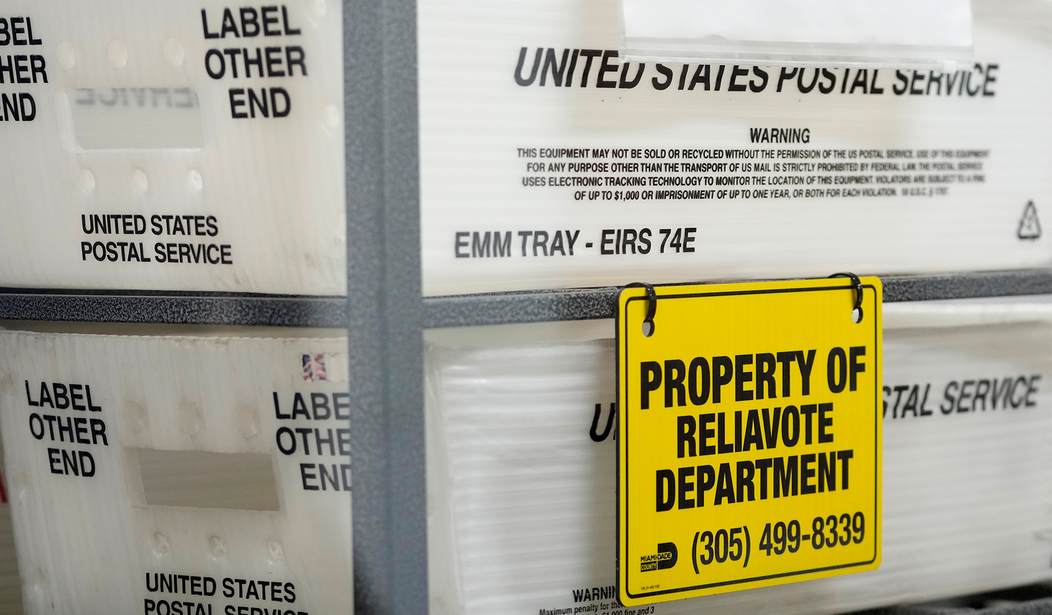I'm very conflicted about mail-in voting. On one hand, I hate it because it isn't secure. On the other hand, Democrats have been successfully using it to bank votes, giving them a hefty advantage on Election Day, and I think Republicans have to play by the same rules as Democrats to be competitive. Make no mistake about it: had it not been for massive mail-in voting in 2020, Donald Trump would be president right now and you'd be paying a lot less at the grocery store and the gas station.
But, then, of course, there are reasons why, despite that advantage, I don't want to touch mail-in voting with a ten-foot pole. According to a new report from NBC News, there have been nationwide delays in deliveries by the U.S. Postal Service "raising concerns that mail-in ballots could be affected in the upcoming election."
"Across the country, residents and businesses have been reporting widespread slowdowns in mail and package delivery by the U.S. Postal Service," the report explains. "The delays have become so persistent that members of Congress have gotten involved, urging the Postal Service to drastically correct course and raising concern about what impact the disruptions could have on mail-in ballots in the upcoming election."
The delays appear to largely stem from a new system the Postal Service began rolling out last fall that will eventually funnel all the nation’s letters and packages through a consolidated network of 60 regional distribution centers — similar to the airlines’ hub-and-spoke model. The change is part of a wider $40 billion, 10-year overhaul of the network that Postmaster General Louis DeJoy has said will reduce costs, improve reliability and make the Postal Service more competitive. But in some instances, the plan has done the opposite, according to the Office of the Inspector General for the Postal Service, members of Congress and Postal Service advocacy groups.
The problem has gotten so bad that Leo Raymond, a former postal service manager and managing director of Mailers Hub, an industry group for direct mail companies, called the situation "a dumpster fire."
“If you’re a business, you’re going to be discouraged from using the mail because you want your stuff to actually get there,” he said.
Nationwide, 87% of first class, two-day mail arrived on time during the last three months of 2023, a 2.5 percentage-point decrease from the same period a year earlier, according to data published by the Postal Service inspector general. For mail intended to take three to five days, just 70% arrived on time, a decrease of 11 percentage points, the data showed.
That sure sounds like a great system to trust with your vote, doesn't it?
Recommended: A Federal Court May Have Helped Prevent the Dems From Stealing Pennsylvania in November
But, here's what really sticks out to me:
A top senator with oversight of the Postal Service, Gary Peters, called on the agency last month to pause any further changes to its distribution network over fears the delays could worsen and spread. But an official with Peters’ office said there has been no indication the Postal Service plans to do so.
“The nature of USPS’s network changes has now raised significant concerns including the potential for degraded rural service due to fewer facilities, delayed delivery of election mail that would be processed at out-of-state facilities, and critical health information such as laboratory tests not being processed same-day due to decreased transportation trips,” said Peters, a Michigan Democrat, in a March letter to DeJoy.
Gee, and what kind of voters are more prevalent in rural areas? Republican voters.
In the end, mail-in voting is bad and should be abolished save for specific circumstances. Call me old school, but I'm all for people voting on Election Day. Frankly, reports like this not only make me think that maybe embracing mail-in voting to compete with Democrats is a bad idea, and perhaps Democrats who are all for it may find that it backfires on them.










